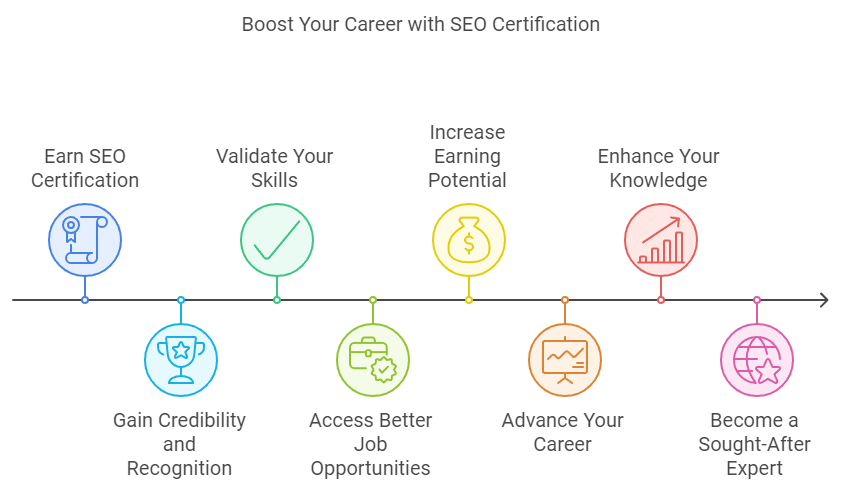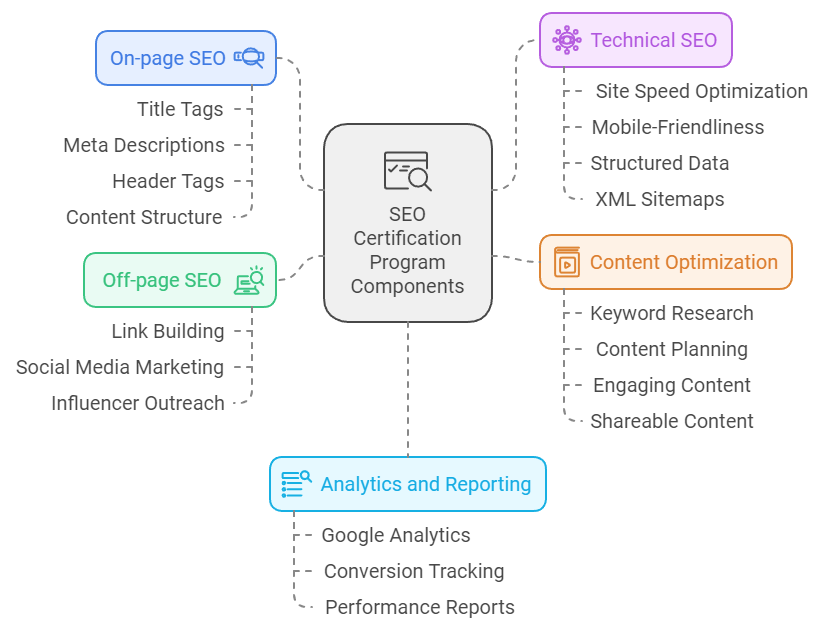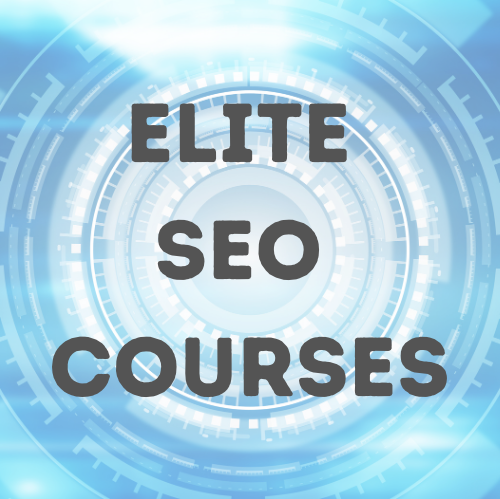SEO Certification: Boost Your Digital Marketing Credentials
Search Engine Optimization (SEO) certification formally recognizes an individual’s expertise in optimizing websites for search engines. In today’s digital landscape, where online visibility can make or break a business, SEO certification has become increasingly important for marketing professionals. As someone considering an SEO certification program, you’re taking a crucial step towards enhancing your skills and advancing your career in the ever-evolving field of digital marketing.

The Value of SEO Certification
SEO certification offers several key benefits that can significantly impact your career trajectory:
-
Credibility and Recognition: In the competitive world of digital marketing, standing out is crucial. An SEO certification from a reputable organization is a badge of honor, demonstrating your commitment to the field and validating your skills to potential employers or clients. It shows that you’ve invested time and effort to master the intricacies of SEO, which can be a decisive factor in landing new job opportunities or clients.
-
Skill Validation: Certification programs ensure you have a standardized set of skills and up-to-date knowledge in SEO practices. This is particularly valuable in a field where techniques and best practices constantly evolve. By earning a certification, you’re proving that your knowledge is current and aligned with industry standards, giving you confidence in your abilities and reassuring those who might hire you.
-
Career Advancement: Certified professionals often have access to better job opportunities and higher earning potential in the competitive digital marketing industry. Many employers view SEO certification as a differentiator when choosing between candidates. It can open doors to senior positions and specialized roles or even enable you to command higher rates as a freelance SEO consultant.
Moreover, obtaining certification itself is a valuable learning experience. It exposes you to a wide range of SEO concepts and practices, potentially filling gaps in your knowledge and introducing you to new tools and techniques you might not have encountered otherwise.
Types of SEO Certifications
When exploring SEO certification options, you’ll encounter several types, each with its focus and benefits:
-
Vendor-specific Certifications: Companies like Google, HubSpot, and SEMrush offer certifications focusing on their particular tools and methodologies. For instance, the Google Analytics Individual Qualification is highly regarded in the industry and can be particularly valuable if you’re working with Google’s suite of tools. These certifications are often free or low-cost and can be completed relatively quickly.
-
Industry Association Certifications: Professional organizations like the Search Engine Marketing Professional Organization (SEMPO) offer certifications that provide a more vendor-neutral approach to SEO. These certifications often cover a broader range of topics and maybe more comprehensive in their approach to SEO strategy.
-
Academic Institution Certifications: Some universities and colleges offer SEO certifications in their digital marketing programs. These tend to be more in-depth and may take longer to complete, but they often provide a solid theoretical foundation alongside practical skills.
When choosing between these types, consider your career goals, the tools you’re likely to use in your work, and the level of depth you’re seeking in your SEO education. A combination of certifications might be the best approach, starting with vendor-specific certifications to build practical skills and then moving on to broader industry certifications to round out your knowledge.

Key Components of SEO Certification Programs
Most SEO certification programs cover a range of core areas essential to effective search engine optimization. Understanding these components can help you choose a program that aligns with your learning goals:
-
On-page SEO techniques: Optimizing individual web pages to rank higher and earn more relevant traffic. You’ll learn about optimizing title tags, meta descriptions, header tags, and content structure. Understanding these elements is crucial for making your website more search engine—and user-friendly.
-
Off-page SEO strategies: These strategies focus on actions taken outside of your website to impact your rankings within search engine results pages (SERPs). Key topics include link building, social media marketing, and influencer outreach. These strategies help build your site’s authority and credibility in the eyes of search engines.
-
Technical SEO knowledge: This involves optimizing your website’s infrastructure to improve its visibility to search engines. You’ll learn about site speed optimization, mobile-friendliness, structured data, and XML sitemaps. This knowledge is essential for ensuring search engines can effectively crawl and index your site.
-
Content optimization: Content is at the heart of SEO. You’ll learn how to create and optimize content that satisfies user intent and search engine algorithms. This includes keyword research, content planning, and creating engaging, shareable content that naturally earns backlinks.
-
Analytics and reporting: It is crucial to understand how to measure the success of your SEO efforts. You’ll learn how to use tools like Google Analytics to track your website’s performance, set up conversion tracking, and create reports demonstrating the value of your SEO work.
A comprehensive SEO certification program should cover all these areas, providing you with a well-rounded skill set to apply to real-world SEO challenges.
Top SEO Certification Programs
While there are many SEO certification programs available, some stand out for their comprehensive curriculum, industry recognition, and the value they provide to certificate holders:
-
Google Analytics Individual Qualification: This free certification from Google covers the fundamentals of digital analytics and how to use Google Analytics. While not strictly an SEO certification, it’s essential for any SEO professional as it teaches you how to measure and analyze the impact of your SEO efforts.
-
SEMrush SEO Certification: SEMrush offers a free SEO certification that covers a wide range of topics, from technical SEO to content marketing. It’s particularly valuable if you’re using SEMrush tools in your work, but the knowledge is applicable across platforms.
-
HubSpot SEO Certification: This free certification provides a solid foundation in inbound marketing and SEO. It’s beneficial for those working in content-driven SEO strategies.
-
Moz SEO Essentials Certification: Moz is a respected name in the SEO industry. Its certification covers both foundational and advanced SEO concepts. It’s a paid certification that provides in-depth knowledge and practical skills.
-
Yoast SEO Certification: Known for its popular WordPress plugin, Yoast offers a comprehensive SEO training program that culminates in certification. This certification is particularly valuable for those working with WordPress sites.
When choosing a program, consider factors like cost, time commitment, and the specific areas of SEO you want to focus on. It’s often beneficial to start with a free, foundational certification like Google Analytics or SEMrush and then progress to more specialized or advanced certifications as you grow in your career.
The Certification Process
Understanding the certification process can help you prepare effectively and set realistic expectations. Here’s what you can typically expect:
-
Prerequisites: Some programs may require prior knowledge or experience in digital marketing. For example, advanced certifications might assume a basic understanding of SEO principles. Be sure to check the requirements before enrolling.
-
Study Materials: Most certification providers offer comprehensive study guides, video tutorials, and practice tests. These resources are designed to prepare you for the exam and provide practical knowledge you can apply in your work. If needed, take advantage of all available materials and supplement them with additional reading or online courses.
-
Examination: The format can vary significantly between certifications. Some, like Google’s certifications, use multiple-choice exams that can be taken online. Others might include practical projects or case studies. The examination tests your memorization of facts and ability to apply SEO concepts to real-world scenarios.
-
Time Commitment: The time required to prepare for and complete a certification can range from a few hours for basic certifications to several weeks for more comprehensive programs. Create a study schedule that fits your lifestyle and learning pace.
-
Costs: Fees can range from free (like Google Analytics and HubSpot certifications) to several hundred dollars for more advanced or specialized certifications. Consider the potential return on investment regarding career advancement or increased earning potential.
Remember, the goal isn’t just to pass the exam but to gain knowledge and skills you can apply to your work. Take your time to thoroughly understand the concepts, not just memorize answers for the test.
Maintaining SEO Certification
SEO is a rapidly evolving field, and maintaining your certification is crucial to staying relevant in the industry:
Most certifications are valid for 1-2 years, after which you’ll need to recertify. This isn’t just a formality – it’s an opportunity to refresh your knowledge and learn about the latest developments in SEO. Search engines frequently update their algorithms, and new tools and techniques are constantly emerging.
Renewal often involves retaking the exam or completing continuing education credits. Some programs, like Google’s certifications, require you to retake the exam to ensure your knowledge is up-to-date. Others might offer alternative recertification ways, such as attending webinars or completing additional courses.
Beyond formal recertification, staying current with industry trends and updates is essential for any SEO professional. Follow industry blogs, attend conferences, participate in webinars, and engage with the SEO community on social media platforms. This ongoing learning will help you maintain your certification and keep your skills sharp and relevant in a competitive job market.
Choosing the Right SEO Certification
Selecting the right SEO certification is a crucial decision impacting your career trajectory. Here are some factors to consider:
-
Industry recognition: Look for well-respected certifications in the digital marketing industry—research job postings in your desired roles to see which certifications are frequently mentioned as requirements or preferences.
-
The comprehensiveness of the curriculum: Review the syllabus to ensure it covers all SEO aspects relevant to your career goals. A good certification program should balance theoretical knowledge and practical skills.
-
Cost and time commitment: Consider your budget and the time you can dedicate to obtaining the certification. Some free certifications offer excellent value, while paid programs might provide more in-depth knowledge or better industry recognition.
-
Alignment with career goals: Consider where you want to be and choose a certification that will help you achieve that goal. If you’re aiming for a specialized role, look for certifications that focus on that area.
-
Program reputation and reviews: Look for reviews and testimonials from past participants. These can provide valuable insights into the quality of the program and its real-world applicability.
Remember, there’s no one-size-fits-all solution. The best certification for you depends on your skills, career aspirations, and learning style. It’s often beneficial to start with a broad, foundational certification and then pursue more specialized certifications as you progress in your career.
SEO Certification Programs
SEO certification classes are in-person, instructor-led courses that provide an immersive learning experience. These classes are typically shorter and more focused. They may cover SEO fundamentals, on-page optimization, technical SEO, local SEO, and advanced SEO techniques.
HubSpot Academy’s SEO Training Course
The HubSpot Academy SEO Certification is an ideal course for marketers and content creators looking to enhance their SEO skills. With expert instructors Rachel Sheldon and Matthew Howells-Barby, this comprehensive course covers a range of topics from SEO basics to advanced techniques. Participants can expect to learn website optimization, link building, keyword research, and SEO reporting in this self-paced, 3-hour and 51-minute course. The course is free and provides a certification upon completion, making it a valuable addition to any professional’s digital marketing or content creation skillset.
SEMrush SEO Crash Course
The SEMrush SEO Crash Course, led by SEO expert Brian Dean, is a concise and actionable learning opportunity for individuals new to SEO or those needing a refresher. The course covers foundational SEO concepts, including keyword research, content creation, link building, and tracking SEO results, making it ideal for beginners in digital marketing, content marketing, and website management. With a self-paced learning structure and a free certification upon completion, participants will gain valuable insights and practical skills to improve their website’s visibility on Google.
Google SEO Fundamentals
The Google SEO Certification course, offered by the University of California, Davis, is a comprehensive and flexible program designed for individuals seeking to learn or enhance their knowledge of search engine optimization (SEO) strategies and techniques. This course benefits various professionals, including digital marketers, SEO specialists, content creators, web developers, and business owners. With an experienced instructor, a wide range of topics, and flexible deadlines, learners can gain a solid foundation in SEO to improve website visibility and drive organic traffic, ultimately benefiting their careers or businesses. However, the course requires a financial investment and a 29-hour time commitment, which may not suit everyone’s preferences or schedules.
Benefits for Employers
SEO certification is valuable not only for individuals but also for organizations. If you’re an employer or looking to pitch the idea of certification to your company, consider these benefits:
Ensuring team competency in SEO practices is crucial in today’s digital landscape. When team members are certified, they have a standardized level of knowledge and skills, which can lead to more consistent and effective SEO strategies across all projects and clients.
Certification helps standardize SEO strategies across the organization. When everyone on the team has undergone the same certification process, it creates a common language and approach to SEO. This consistency can improve collaboration, streamline processes, and reduce errors or conflicting strategies.
Having certified SEO professionals on staff demonstrates a commitment to providing high-quality SEO services to clients. It can be a powerful selling point when pitching to potential clients or partners, showing that your organization invests in its employees’ skills and stays current with industry best practices.
Moreover, encouraging and supporting employee certification can boost morale and loyalty. It shows that the company is invested in its employees’ professional development, which can lead to higher job satisfaction and retention rates.
Limitations of SEO Certification
While SEO certification offers many benefits, it’s essential to be aware of its limitations:
The rapid evolution of SEO means that some information may become outdated quickly. Search engines frequently update their algorithms, and new tools and techniques are constantly emerging. While certification programs strive to stay current, there may be a lag between the latest developments and their inclusion in certification curricula.
Practical experience is crucial and cannot be replaced by certification alone. SEO is as much an art as a science; many skills are best learned through hands-on experience. Certification provides a solid foundation, but applying that knowledge to real-world scenarios is where true expertise is developed.
Some programs may not cover the latest trends or techniques in SEO. For example, not all certification programs fully address emerging areas like voice search optimization or AI-driven content creation.
It is essential to view certification as a starting point rather than an endpoint in your SEO education. Use it as a foundation to build upon with practical experience, ongoing learning, and staying engaged with the SEO community.
Future of SEO Certification
The field of SEO certification is likely to evolve alongside the broader digital marketing landscape:
Emerging AI and machine learning trends will likely be incorporated into future certifications. As these technologies play an increasingly important role in search algorithms and SEO tools, understanding how to work with and leverage them will become a crucial skill for SEO professionals.
There may be a move towards more specialized certifications focusing on niche areas of SEO. As the field becomes more complex, we might see certifications for areas like local SEO, e-commerce SEO, or SEO for specific industries.
Industry standards for SEO certification may become more unified and widely recognized. As SEO’s importance grows, we may see efforts to create standardized, industry-wide certifications similar to those in project management or IT.
Certifications may also evolve to include more practical, hands-on components. This could involve real-world projects or simulations that test knowledge and the ability to apply SEO skills in complex scenarios.
As an aspiring SEO professional, staying informed about these trends and being prepared to adapt your skills will be critical to long-term success in the field.
Additional Resources
To further your SEO education and stay updated on the latest trends, consider these resources:
- Google Analytics Academy: Offers free courses on Google Analytics and other Google tools essential for SEO.
- Search Engine Journal: An excellent resource for staying updated on SEO trends and best practices.
- Google Search Central Blog: Official updates and guidelines from Google are essential for understanding search engine changes.
Remember, the most successful SEO professionals combine certified knowledge with practical experience and a commitment to continuous learning. Good luck on your SEO certification journey!
